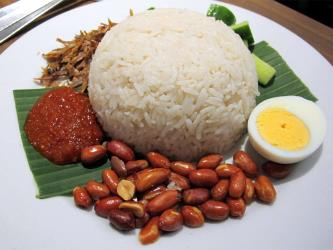Nasi Lemak

Nasi Lemak is a Malay fragrant rice dish cooked in coconut milk and pandan leaf.
It is commonly found every places in Malaysia, where it is considered the
national dish and also popular in neighbouring countries such as Singapore and
Indonesia.
Nasi Lemak is considered one of the most famous dishes for Malay-type breakfast.
It is not to be confused with Nasi Dagang sold in the Malaysian east coast
states of Terengganu and Kelantan although both dishes can usually be found sold
side by side for breakfast. However, because of Nasi Lemak's versatility in
being able to be served in a variety of manners, it is now served and eaten any
time of the day. Nasi Lemak was also recently voted the top 10 healthy breakfast
by TIME magazine.
In Malaysia and Singapore, Nasi Lemak comes in many variations as they are
prepared by different chefs from different cultures. The original Nasi Lemak in
Malaysia is arguably a typical Southern and Central Peninsular Malaysia
breakfast, and is considered of Malay origin. However, due to the popularity of
the dish, it is regarded as a national dish.
The rice cooked in coconut milk is actually common in Southeast Asia. This is
the same process used to make similar rice dishes from their neighbouring
country Indonesia, which are Nasi Uduk from Jakarta, Nasi Gurih from Aceh and
Javanese Nasi Liwet. However, there are differences in taste because knotted
leaves of Pandan screwpine are steamed with the rice for impart flavour and
fragrance. Less often other spices such as ginger and occasionally herbs like
lemon grass may be added for additional fragrance.
Nasi Lemak in the Northern West Peninsular tends to include curry. The sambal
tends to range from fiery hot to mildly hot with a sweet under taste. Nasi Lemak
is not as popular as the indigenous Nasi Berlauk, Nasi Dagang, and Nasi Kerabu
in North East Peninsular Malaysia. It is regarded as a speciality imported dish
in Sabah and Sarawak.
Hotels often feature Nasi Lemak on their menu with elaborate dishes, such as
beef rendang and the addition of other seafood. Hawker centres in Singapore and
Malaysia usually wrap them in banana leaves to enhance the flavour. Roadside
stalls sell them ready packed, known as "Nasi Lemak bungkus", with minimal
additions that cost between RM1.00 – RM6.00 per pack. Seafood outlets often
serve the basic Nasi Lemak to accompany barbecued seafood.
There are Malaysian
Chinese and Malaysian Indian versions, and Singaporean Malay and Singaporean
Chinese versions. Some people suggest that sambal is the most important part of
a Nasi Lemak meal. If not prepared properly, it could ruin the dish, since
Malaysians love food that is hot and spicy. A good deal of spirited and
good-natured debate exists around this point.
undo Malaysian Foods